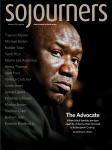EVERY WEDNESDAY night, Sam’s youth group met in a darkened gymnasium dressed up as a rock concert: decorative fabrics, professional sound equipment, and a light show. A thin, attractive youth pastor with a soul patch and skinny jeans would deliver a message about the evils of sex, drugs, and alcohol.
In Matthew’s gospel, Jesus says, “You have heard that it was said, ‘You shall not commit adultery.’ But I say to you that everyone who looks at a woman with lust has already committed adultery with her in his heart.” This was a favorite verse of Sam’s youth pastors, who wielded it to warn kids against even thinking about sex. If lusting after a woman was just as bad as committing adultery, their logic held, then even thinking about sex is a sin.
“The weird thing,” Sam told me, “was that it wasn’t date rape or sexual harassment or even treating people disrespectfully that they were worried about. It was ‘impure thoughts’ and lust.”
There are two problems that I see here: One, these were teenagers, whose bodies are designed by God to become sexual, and two, the Greek word for lust, epithymia, is about general desire, not thinking sexual thoughts. If epithymia was a term for sexual desire, it would make some other things Jesus said super weird. (For example, Luke 22:15: “And he said to them, I have had sexual thoughts about eating this Passover with you before I suffer.”)
More than willing bodies
In Martin Luther’s Small Catechism, he teaches that the Ten Commandments are about more than the mere absence of bad behavior. They’re also about the presence of good. For instance, you would think that fulfilling the fifth commandment, Thou shall not murder, would be a freebie—like the middle square of the bingo card, one we can all just cross off right away. But Luther teaches that fulfilling the fifth commandment requires more than just not killing people. Luther teaches that Thou shall not murder means that “we are to love and fear God, so that we neither endanger nor harm the lives of our neighbors, but instead help and support them in all of life’s needs.” Do no harm and support others in all their needs.
Likewise, where sex is concerned, for sexual flourishing to occur we must be guided by more than just the absence of “no” and the absence of harm. That’s why I believe we must also bring concern to our consent and mutuality. Concern moves us closer to the heart of Jesus’ own ethic: Love God and our neighbor as ourselves. It requires us to act on another’s behalf. It reframes the choice entirely outside of our own self-interest in a way that consent and mutuality alone do not.
Concern means taking notice of how our sexual behavior affects ourselves and each other. I may be having a mutually pleasurable, consensual relationship with someone, but if I am cheating on my spouse at the time, I have failed to show concern for the person I am married to. If I am in a crisis and totally distraught, I may be more likely to consent to sex when in fact it is the last thing I need. If someone intuits this and sleeps with me anyway, they have consent, but they are not showing care and concern. A sexual ethic that includes concern means seeing someone as a whole person and not just a willing body.
Like Sam, I was taught as a child that the Ten Commandments—and, really, all the rules in the Bible, plus several the church just kind of made up—were there because God loves us and wants us to be happy. But in Lutheran seminary I learned that the Ten Commandments are actually about the fact that God loves our neighbors and wants to protect them from us. When Luther took away the Thou shall not murder free space in the middle of our moral bingo card, he was taking his cue from Jesus. In this text from Matthew, Jesus is saying that Thou shall not commit adultery is not simply a matter of not screwing someone other than your spouse. He’s saying, once again, “Love your neighbor. People aren’t objects. Let’s not cause each other harm.”
Nevertheless, Sam would sit in the gymnasium-turned-low-budget-pop-concert, listening to warnings against sexual thoughts and indulging in fantasy. Pornography, in particular, was condemned via a “God knows what websites you visit in the dark” type of admonishment.
“There was always a hint of ‘If you continue a pattern of sin [in which you look at pornography], you’re not a real Christian,’” he explained to me. “All of these messages worked together to convince me that my faith wasn’t real because I ‘struggled’ with sexual desire.”
A loss of pleasure
Sam shut a part of himself down in order to please God. He disconnected from his body and his desires, and it backfired. Eventually Sam found it difficult to connect with even his own feelings, express them, and be heard by those closest to him. In the absence of these vital, intimate connections, he turned to porn to numb the pain.
Sam now considers himself a porn addict.
In my pastoral work I’ve started to suspect that the more someone was exposed to religious messages about controlling their desires, avoiding sexual thoughts, and not lusting in their hearts, the less likely they are to be integrated physically, emotionally, sexually, and spiritually. I’ve also noticed that the less integrated physically, emotionally, sexually, and spiritually someone is, the more pornography they tend to consume. This is anecdotal evidence and not a scientific study. Nonetheless, I’d like to congratulate conservative Christians on their success in bolstering an industry that they claim to despise.
There is nothing wrong with the fact that our bodies are created to experience pleasure. There is nothing wrong with the fact that our bodies are stimulated by sexual stories and images. It’s an empathic response. And just as humans have eaten sweets since the dawn of time, so too have human beings created erotic images as soon as we figured out how to scratch them on the insides of caves.
But what was different a generation ago was that we didn’t have access to things like Slurpees and Pornhub. Both the sweets and the sex available to us 24/7 today are exponentially more condensed in form and more convenient to access than anything our ancestors could have imagined. And I wonder if the cost of this, among other things, is a loss of pleasure, not an abundance of it. Can we enjoy the pleasure of our middle-aged spouse’s body after consuming two straight hours of internet porn featuring impossibly perfect, hairless, willing, youthful actors? How do we appreciate the sweetness of an apple after consuming 32 ounces of Mountain Dew?
Have your cake...
“God a hedonist at heart,” complains one devil to another in C.S. Lewis’ The Screwtape Letters. “He has filled His world full of pleasures. There are things for humans to do all day long without His minding in the least—sleeping, washing, eating, drinking, making love, playing, praying, working. Everything has to be twisted before it’s any use to us.”
Here’s what I know about this list: Every last one of these things is morally neutral. Every last one of those activities can cause harm if overdone. And every last one can also bring joy. Too much sleep and your life falls apart; too little and you cannot function. Too much washing and you end up with OCD and raw skin; too little and you smell. Too much praying and you forget to actually take action; too little and you forget that there is a power greater than yourself. Too much making love and you could get sore (and also the dishes never get done, and there isn’t time to long for sex again); too little and ... what?
So, how do human beings with our dual natures (being simultaneously sinner and saint) navigate a world full of pleasure when we so easily fall off either end of the abstinence-indulgence continuum? Well, perhaps we should consider what our theology of pleasure is. Because, friend, I do not believe God is monitoring your ability to steer clear of life’s pleasures. Viewing sexually explicit images doesn’t have to be harmful, just like eating cake doesn’t have to be harmful. But there is potential harm in both, and the harm varies according to who we are individually: our wiring, our histories, our relationships.
Some of us can eat a piece of chocolate cake once a month, enjoy the pleasure of it, and then immediately return to our balanced diet. But if you find that when you eat chocolate cake a switch gets flipped and suddenly you have no taste for anything else, to the extent that you only desire cake, cake might not be for you. Still, I will not sit here and say that no one should ever eat cake and that it destroys people’s lives, just like I would never say that people should not drink because alcohol destroyed mine. Or that no one should ever view erotic imagery because someone else has developed destructive behaviors around it.
Problems can absolutely arise from the consumption of pornography, including sexual partners’ feelings of betrayal and compulsive behaviors that inhibit healthy sexual activity. (Not to mention that there are serious issues of consent, dignity, and justice in the porn industry.) Some people can watch porn and still have a very real and intimate connection with their partner; for them, watching it together doesn’t diminish or disrespect their relationship. I have heard this story in my parish. Others have to steer clear entirely. For them, just a few moments of porn and they cannot stop no matter all the reasons they can conjure to control themselves, and their compulsion causes insecurity in their partner and intimacy problems in their relationship. I have also heard this story in my parish.
Complicated gifts
I have no answers here. But what I will not do is pick the low-hanging fruit of moral outrage about porn that comes from both liberals and conservatives. Not while the consumption of pornography is so ubiquitous. I suspect a Venn diagram of those who express disgust about porn (either for reasons of justice or for reasons of sexual morality) and those who secretly watch porn would show a significant overlap. Expressing one thing and doing another is a fearful, lonely place to be, and as a pastor I have no interest in adding to the shame so many people already have about porn, especially those who feel that they should “know better.” I believe we can apply an ethic of concern here by acknowledging the potential harm without shaming the behavior entirely.
The point is, it all calls for attention. Does something enhance my life and relationships, or does it take it over? Is my behavior compulsive? When I or my partner experience this pleasure, is it bringing me or my partner more deeply into the moment, into the sacred, into our bodies, or is it separating one or both of us from these things?
I believe that our ability to experience pleasure in general, sexual and culinary specifically, is a gift from God, but I am also aware of how tricky these gifts are, and how easily twisted they can be, as Screwtape would say—twisted into dangerous things we avoid (thus eating benzocaine-containing “diet candy” and trying to not even think sexual thoughts) or into pain-numbing things we gratuitously gorge upon (thus shame-eating an entire cheesecake or streaming Edward Penishands).
As a pastor, I find myself concerned for the self-hatred my parishioners who’ve struggled with porn describe, and I wonder how we could begin to honor sexual pleasure as something that can connect us more deeply to ourselves and others and God, yet still speak the truth about the ways in which our behaviors around sex can also do the opposite. Perhaps we could start by remembering what St. Paul wrote in 1 Corinthians: that all things are lawful but not all things are beneficial.
To begin with, I think the church could be a place that bravely encourages a healthy exploration into what the erotic actually is, at its best. The erotic can be that which opens us, peeling away our protective layer. Like citrus, there’s a juicy, delicious part of us which if always exposed may wither. That’s what the erotic accesses in us. The peel is there for a reason. There’s nothing wrong with it. I cannot move through the world without protecting the parts of me that are the sweetest and most vulnerable.
But the erotic can be the way in which the smell of a lover’s neck exposes something in us, like a thumbnail making the first opening into the skin of a tangerine. The vascular and the venial become one, and our breath itself changes. The erotic exposes complex layers of surface area: psyche, heart, body, desire, beauty. It is worthy of our attention and our concern.
Adapted from Shameless: A Sexual Reformation copyright 2019 (Convergent Books, an imprint of Penguin Random House LLC).
Got something to say about what you're reading? We value your feedback!








